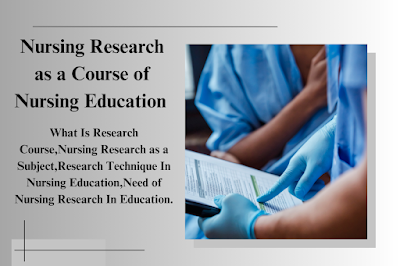Nursing Research as a Course of Nursing Introduction
Research is a fundamental component of nursing education that equips students with the skills necessary to conduct and apply research in practice. As evidence-based practice (EBP) becomes increasingly central to nursing, understanding and engaging in research is crucial for both educational advancement and professional development. This article explores the significance of research courses in nursing education, the role of nursing research as a subject, effective research techniques, and the need for nursing research within educational frameworks.
What Is a Research Course?
A research course in nursing education is designed to introduce students to the systematic process of inquiry, enabling them to validate and refine existing knowledge and develop new insights within the discipline. According to Polit and Beck (2012), research involves a rigorous, empirical approach to studying phenomena to contribute to scientific knowledge. In nursing, this translates into investigating various aspects of patient care, health outcomes, and clinical practices to improve healthcare delivery.
The primary objectives of a research course are to:
- Introduce Research Methodologies: Students learn about different research designs and methodologies, including qualitative, quantitative, and mixed-methods approaches.
- Develop Critical Thinking Skills: Students are trained to critically evaluate research findings, assess the validity and reliability of studies, and apply evidence to practice.
- Foster Evidence-Based Practice: By understanding how to conduct and interpret research, students are prepared to integrate evidence into clinical decision-making, ultimately enhancing patient care and outcomes.
A well-structured research course provides students with foundational knowledge in research ethics, statistics, and nursing theory, creating a comprehensive learning experience that supports the development of critical research competencies.
Nursing Research as a Subject
Teaching nursing research presents several challenges and opportunities. The complexity arises from the need to effectively engage students in learning while integrating key components of research such as ethics, statistics, and theoretical frameworks. Research courses should aim to:
- Facilitate Engagement: Effective teaching strategies involve interactive and participatory methods that encourage active student involvement. Techniques such as group discussions, hands-on data collection, and critical appraisal exercises help make research concepts more accessible and relevant.
- Incorporate Key Sciences: Nursing research education must integrate ethical considerations, statistical analysis, and theoretical perspectives. Students should understand the ethical implications of their research, be proficient in statistical techniques to analyze data, and apply nursing theories to guide their research questions and interpretations.
- Differentiate Competencies: The nursing program should be structured to ensure that students at different levels attain appropriate research competencies. For undergraduate students, the focus should be on understanding and applying evidence. For graduate students, the emphasis shifts to critically appraising and synthesizing research findings to identify best practices for specific patient populations (AACN, 2006).
- Promote Critical Consumption: All nursing students should become critical consumers of research. This involves evaluating the credibility and applicability of research findings to practice. The American Association of Colleges of Nursing (AACN) outlines competencies for various levels of nursing education, emphasizing the importance of integrating research findings into clinical practice (AACN, 2006).
Research Techniques in Nursing Education
Effective teaching of research techniques in nursing involves a variety of experiential learning strategies:
- Developing Research Questions: Teaching students to formulate researchable questions using frameworks such as PICOT (Population, Intervention, Comparison, Outcome, Time) is crucial. This helps students structure their inquiries and align them with appropriate research designs.
- Conducting Literature Reviews: Students learn to write integrative literature reviews, synthesizing existing research to identify gaps and inform their own research questions.
- Data Collection and Analysis: Engaging students in hands-on data collection and analysis provides practical experience. Techniques include conducting interviews, administering surveys, and analyzing qualitative and quantitative data.
- Critical Appraisal: Students practice critically appraising both quantitative and qualitative studies. This includes evaluating study designs, methods, and findings to determine their validity and relevance.
- Research Proposals and Presentations: Writing research proposals and presenting their findings helps students develop skills in articulating research plans and communicating results effectively.
- Collaborative Learning: Collaborating with academic librarians for information literacy, participating in journal clubs, and engaging in service-learning projects enhance students’ research skills and foster a collaborative approach to learning.
- Integration with Clinical Practice: Some research courses are designed to be co-requisite with clinical courses, allowing students to apply research findings directly to clinical practice and observe the impact of evidence-based interventions.
Need for Nursing Research in Education
Incorporating research into nursing education is essential for several reasons:
- Evidence-Based Practice: Research education ensures that nursing students and professionals are equipped to engage in evidence-based practice. This involves integrating the best available evidence into clinical decision-making to improve patient outcomes.
- Interdisciplinary Collaboration: Teaching research as an interdisciplinary course fosters collaboration among health professionals. By working together, students from different disciplines can focus on creating evidence for specific patient populations, enhancing the quality of care and promoting interprofessional teamwork.
- Active Learning: Research courses should be designed to actively engage students through innovative teaching strategies. This promotes active learning and helps students develop a deeper understanding of research concepts and their application in practice.
- Lifelong Learning: Research should be integrated throughout the nursing curriculum and emphasized as part of a lifelong learning approach. Continuous engagement with research ensures that nursing professionals stay updated with the latest evidence and advances in healthcare.
- Preparation for Future Research: Providing students with a solid foundation in research prepares them for future roles as researchers, educators, and practitioners who contribute to advancing nursing science and improving healthcare delivery.
Conclusion
Research courses are a vital component of nursing education, providing students with the skills and knowledge necessary to conduct and apply research in their professional practice. Effective teaching strategies, integration of key scientific components, and an emphasis on evidence-based practice are essential for preparing students to become competent researchers and critical consumers of evidence. By fostering a strong foundation in research, nursing education ensures that future professionals are equipped to contribute to the advancement of nursing science and the improvement of patient care.
